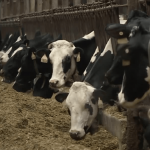
The project will help develop a real-time dairy payment system and supply chain information sharing capacity, using blockchain technology. Blockchain can help provide a shared view of truth about business transactions.
“All sides know they are all looking at the same records and the history of their business relationship. Open, transparent and trustworthy systems are important for long-term sustainability and global competitiveness,” Littleproud said.
Littleproud noted that building on standards already used in transport and logistics, warehousing, distribution, retailing and e-commerce would help Australian producers and processors participate effectively in global markets. The initial phase will raise industry awareness of blockchain and traceability benefits for dairy farmers with a short video and information paper.
ADF President Terry Richardson said blockchain technology could help improve the profitability and efficiency of the Australian dairy industry. Richardson said the first phase is about education, and acts as a precursor to a field trial that will quantify benefits and set the sector up for a more digitalised future.
“The transparency and security of shared information using blockchain technology will demonstrate provenance and reduce costs to compete more aggressively in local and global markets,” Richardson said.
The project will support ADF’s response to the 2018 ACCC inquiry into the competitiveness of prices, trading practices and the supply chain in the Australian dairy industry. Project participants include GS1 Australia, Data61|CSIRO and the dairy industry.
Blockchain could help the industry better manage information, give life to new standard form contracts and build trust, transparency and efficiency between dairy farmers and processors. A decentralised, peer-to-peer network can give each farmer and processor their own ‘node’ to keep information secure and private. When a farmer sells milk to a processor, their nodes use a ‘shared ledger’, which keeps a record of the contracts, milk that has been ordered and delivered, milk quality testing results and payments.
Key terms for delivery and payment in the standard contract can be shared and run as smart contracts on the ledger. The contract on the shared ledger can then automatically calculate the final price. Only the farmer and the processor can add information to the shared ledger, so each can see the full history of their shared business relationship. Advanced blockchain traceability systems will help protect the country’s safe food image and boost export opportunities for farmers.
























